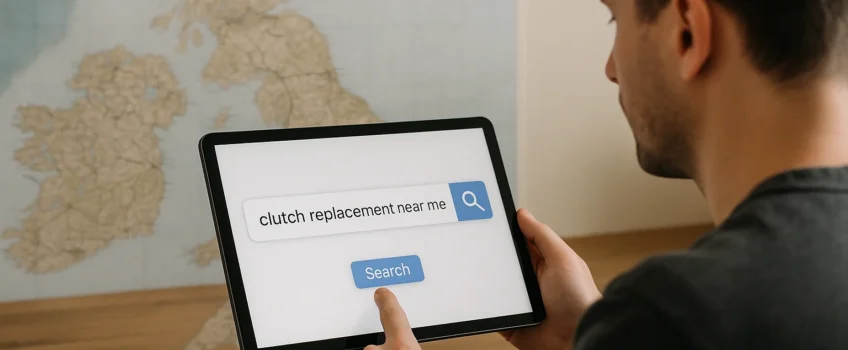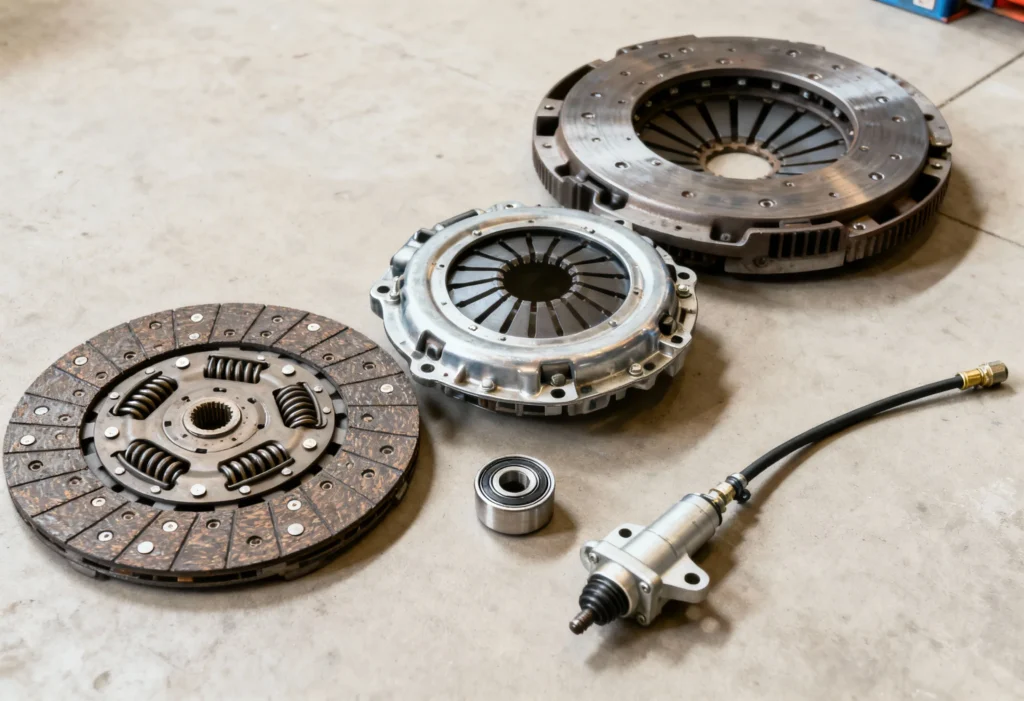
Finding the Best Clutch Replacement Near Me: Expert Diagnosis and Where to Book
Does this sound familiar? “I need a clutch replacement near me, and I need someone I can trust.”
There are few motoring issues that unsettle drivers more than sudden clutch trouble. One moment the car feels normal; the next, the pedal behaves strangely or the engine revs climb without any real pull. When that happens, the instinctive reaction is simple:
At Elite Garages, we’ve seen every version of this scenario over the past 60+ years. Some drivers arrive convinced their clutch is finished, only to discover it’s a minor hydraulic issue. Others turn up having ignored the warning signs for far too long, resulting in a worn-out clutch or even a damaged flywheel.
Wherever you are in that journey, the goal of this guide is to give you clarity. You’ll learn the symptoms that matter, the causes behind them, how a clutch actually works, what repairs involve, and most importantly, where to book a clutch replacement near me at a trusted local Elite branch.
For further reading on this topic, see Why Local Clutch Specialists Matter and Clutch Problems Explained.
When To Find a Clutch Replacement Near Me
Drivers often describe clutch problems in emotional terms before mechanical ones:
- “My car suddenly feels wrong.”
- “It’s like it’s thinking before it accelerates.”
- “The pedal is totally different today.”
- “It smells like something’s burning.”
These feelings matter, because clutch issues often start subtly and escalate quickly.
Here are the most common symptoms you’ll notice before searching for a clutch replacement near me:
- The clutch slips under acceleration: Rev counter climbs but the car doesn’t move as quickly, especially in higher gears or uphill.
- Gear changes feel stiff, crunchy or unpredictable: A dragging clutch (one that doesn’t fully disengage) is usually the culprit.
- The pedal feels soft, spongy or loose: A hydraulic or cable-related issue is often behind this.
- The pedal sticks or doesn’t return naturally: This may indicate a hydraulic blockage, failing pressure plate or worn pedal mechanism.
- You smell burning after pulling away or climbing hills: A classic sign of clutch slip or overheating friction material.
- You hear noises when pressing or releasing the pedal: Chirping, squeaking or grinding often points to a worn release bearing or internal damage.
These symptoms rarely fix themselves. If you notice any combination of them, it’s wise to book an inspection promptly. A quick diagnosis can save you hundreds and prevent further damage.
Why These Clutch Symptoms Feel Worse Than the Actual Problem
Many drivers assume clutch issues automatically mean a costly full replacement. But at Elite, a significant proportion of customers who search for clutch replacement near me actually need something far simpler.
Small issues can mimic major ones:
- Air in hydraulic lines causing a soft pedal
- Contaminated fluid affecting engagement
- A stretched cable causing poor clutch bite
- A worn bearing causing noise
- Minor adjustments needed after other repairs
This is why proper inspection matters. Guesswork often leads to unnecessary repairs, while a trained diagnostic eye can separate real clutch failure from minor but misleading symptoms.
For a deeper explanation, see our detailed breakdown on clutch repairs at Elite Garages.
What’s Actually Going Wrong? Common Causes Behind Clutch Problems
After decades servicing cars, our technicians consistently see the same underlying causes:
- Worn clutch disc – normal wear over miles
- Weak or damaged pressure plate – reduced clamping force
- Release bearing wear – noisy engagement
- Hydraulic failure – leaks, worn seals or trapped air
- Contamination – oil leaking onto the friction material
- Overheating – often from towing, riding the clutch or hill-start strain
- Flywheel damage – common if clutch slip has been ignored
Understanding the real cause helps determine whether you need adjustments, new hydraulic parts, or a complete clutch replacement. For a simple, visual rundown of how clutches work, this guide is particularly useful.
How a Clutch Works (and Why It Matters When Diagnosing Problems)
A clutch isn’t a single part; it’s a system. When you press the pedal, several components work together to disconnect the engine from the gearbox so you can change gear.
Those components typically include:
- Clutch plate (friction disc)
- Pressure plate
- Release bearing
- Flywheel
- Cable or hydraulic mechanism

Because each of these pieces can fail individually, two cars with identical symptoms might need completely different repairs. That’s why searching for a clutch replacement near me is only the first step as accurate diagnosis is what truly saves money.
Types of Clutches: A Simple Guide
Clutches come in several designs, but most UK drivers encounter one of the following:
- Single-plate friction clutch: the most common in manual cars
- Multi-plate clutches: used in high-performance and high-torque vehicles
- Hydraulic clutches: smoother, controlled by fluid, common in modern cars
- Dry clutches: typical in manual vehicles
- Wet clutches: run in oil for cooling, found in some high-performance systems
- Diaphragm clutches: lighter pedal, widely used today
- Dual-clutch systems (DCT): found in many modern automatics, using two clutches for ultra-fast gear changes
You don’t need to know the engineering behind each type—that’s our job—but understanding that different systems exist helps explain why diagnosis can vary widely from car to car.
How Elite Garages Diagnose Clutch Problems (Step by Step)
When you book a clutch replacement near me at Elite, our technicians use a structured diagnostic process to pinpoint the exact issue:
- Pedal feel assessment
- Check of hydraulic or cable mechanisms
- Clutch slip tests under load
- Gear engagement testing
- Inspection for noise or vibration sources
- Visual checks for leaks or contamination
- Flywheel and clutch plate assessment (if inspection is warranted)
Only once we’ve completed the assessment will we advise whether a repair, adjustment, or full replacement is needed.
Visit our website now to book your clutch service online.
How Long Does a Clutch Replacement Take?
Most vehicles take 3–6 hours for a complete clutch replacement, but factors like flywheel condition, access to components and clutch type can influence this. We always provide a clear time estimate before work begins, so you’re never left wondering.
How to Make Your New Clutch Last Longer
Adopting better driving habits can add years to the life of your clutch:
- Avoid riding the clutch at lights
- Use your handbrake instead of balancing on the bite point
- Change gears smoothly
- Don’t tow or overload more than recommended
- Reduce unnecessary stop–start strain where possible
- Small habits make a big difference.
Finding a Clutch Replacement Near Me Across Elite’s Branch Network
Whatever brought you here whether it’s slipping, noise, pedal issues, or simply a gut feeling, Elite Garages branches offer reliable, trusted clutch repairs across the South. Here’s a list of Elite Garages branches that can answer your call for clutch replacement near me. We’ve also included upcoming branches and those offering specialised services such as ADAS calibration.
Elite Garages branches offering clutch replacement services
- Brighton
- Portsmouth
- Bournemouth
- Canterbury
- Caterham
- Eastbourne
- Fareham (also offers ADAS calibration)
- Haywards Heath
- Maidstone
- Mannings Heath
- Newport (IOW)
- Pulborough
- Salisbury (also offers ADAS calibration)
- Shaftesbury
- Southampton (also offers ADAS calibration)
- Strood (clutch repairs yes; MOTs no)
- Walmer (Deal)
- Dorchester
- Denmead (tyre-only location for now so no clutch replacement)
New Elite Garages Branches Coming soon
Whether you’re searching for clutch replacement near me in Brighton, or a Portsmouth clutch garage, Elite provides the consistent, transparent service drivers expect.
Why Customers Find Elite Garages When Searching for Clutch Replacement Near Me
Trusted for over 60 years: Elite has grown steadily across the South without losing the family-run approach that built its reputation.
- Honest pricing and clear communication: No hidden charges. No pressure. No upselling.
- Skilled technicians and advanced tools: Clutch work is complex—and we invest heavily in training and equipment.
- Quality parts every time: Only OE-equivalent or better replacement components used.
- Local convenience: Clutch trouble shouldn’t force you to travel far. With Elite, it rarely does.
The True Value of Booking a Clutch Replacement Near Me at Elite
It’s not just about replacing a worn component. It’s about:
- regaining confidence in the way your car responds
- preventing further mechanical issues
- protecting your gearbox and flywheel
- restoring smooth, predictable driving
- knowing the work is done right the first time
Clutch issues are some of the most unsettling faults a driver can experience. But with proper diagnosis and expert repair, they’re also one of the most satisfying to resolve.
Book Your Clutch Replacement Near Me Today
If your clutch feels different, sounds different, or smells different, trust those instincts. A quick inspection now could prevent costly repairs later. With local branches across the South, trusted technicians, and over six decades of experience, Elite is the natural choice for any driver looking for a clutch replacement near me.
FAQS:
Click the + to read any answer or visit our most FAQ page to review the most frequently asked questions across all our Elite Locations.
If you click on a ‘Category’ or ‘Tag’ link, the page will ‘refresh’ and reload the page showing the top of the page first, you’ll then just need to scroll down to the FAQ section to see the results for the Category or Tag you selected.
A clutch replacement on most vehicles will take between 3–6 hours, but factors like flywheel condition, access to components and clutch type can greatly influence the time frame. We always provide a clear time estimate before work begins, so you’re never left wondering. And, we only use OE or approved quality parts for clutch repairs or replacements.
No, a spongy clutch pedal is not always a bad sign, especially if your car has a hydraulic clutch where this is a fairly common occurrence, but it can be repaired.
Regardless of the clutch type, it’s best to book an inspection. Unsure what type of clutch you have? Check your car owner’s manual or contact your nearest Elite Garage.
No, you really should avoid driving with a slipping clutch; it is very unsafe and you risk causing potentially expensive damage to the flywheel. If your clutch is slipping, smells like something is burning or you have trouble changing gears, book a brake inspection as soon as possible.
Whilst there is no right answer, a clutch typically lasts between 50,000 and 100,000 miles, depending on driving style, vehicle and clutch type.
About Us
Opening Times
Saturday : 8:30–4:00
Sunday : closed
More Information
Contact UsCustomer Information Pack
Check MOT Due Date
Free MOT reminder
Careers
Legal Information
Recent Posts
- Clutch Replacement Near Me: A Comprehensive Guide for UK Drivers
- Antifreeze Coolant: What It Is, How It Works, and When to Use It
- MOT in Brighton: Your Essential Guide to Testing, Servicing and Tyre Safety
- Uneven Tyre Wear Explained: Is It Time for a Wheel Alignment Service?
- Is Your Track Rod End Causing Problems with Wheel Alignment or Suspension?


